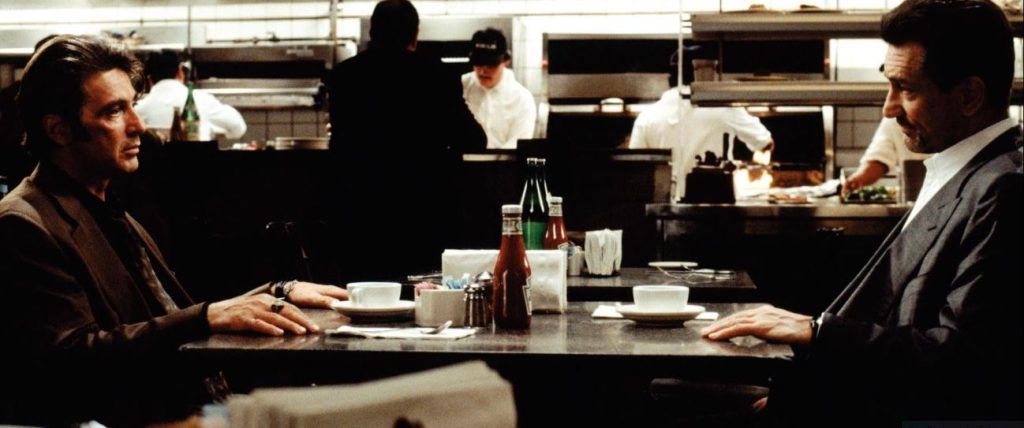
Michael Mann has been making films for more than four decades. He’s no Kubrick, but the similarity of his painstaking approach means it’s pretty straightforward to get up to speed with his concise back catalog. I’ve seen nine of his flicks and would argue Thief, Manhunter and Heat are the pick of the bunch. Heat is his most successful and acclaimed effort, often popping up on the lists of people’s favorite crime thrillers, and far superior to mediocrities like Collateral, Public Enemies and Miami Vice, not to mention an empty, boring dud such as Last of the Mohicans and the daft supernatural mess The Keep. Heat also generated a lot of ballyhoo back in the day for featuring the first onscreen pairing of those acting heavyweights, De Niro and Pacino. Just as well because no one gave a shit when they reteamed for 2008’s Righteous Kill.
Cast: Pacino, De Niro, Val Kilmer, Jon Voight, Tom Sizemore, Diane Venora, Amy Brenneman, Ashley Judd, Kevin Gage, Mykelti Williamson, Wes Studi, Danny Trejo, Natalie Portman
The story: Professional thief Neil McCauley (De Niro) and his ‘real tight’ crew of Chris (Kilmer), Michael (Sizemore) and Gilbert (Trejo) are on a mission to get rich quick by knocking over whatever is on offer in L.A. They’re ultra-careful, technically savvy and ruthless when necessary. In other words, they operate via a well-established code. There’s only one problem: the dogged, equally hardcore Lieutenant Vincent Hanna (Pacino) has caught their naughty scent…
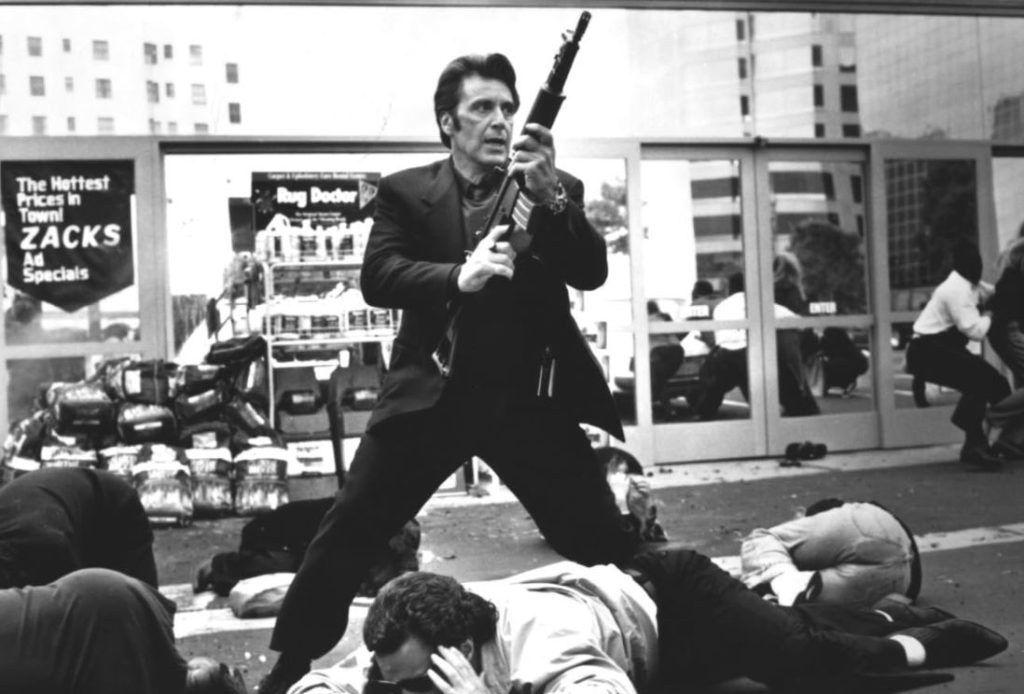
Why it works: Mann’s interest in the precise details of criminals at the sharp end of their trade was established in his debut flick, Thief. The smoothly directed depictions of robberies dotted throughout Heat are exhilarating, typified by the opening heist of an armored pay van which sees McCauley and co don hockey masks, use stingers and execute a shell-shocked guard when there’s no compelling reason to leave him alive. It’s a team that excels at covering all corners, especially if they sense a double cross or the fun-spoiling intervention of ‘heat’.
McCauley pretty much rules Heat, his most memorable moment arriving when he articulates his remain-free-at-all-costs philosophy: “Allow nothing to be in your life that you cannot walk out on in thirty seconds flat if you spot the heat round the corner.” With his steely stare and slickly confident manner, he’s the personification of togetherness. He may be a man of few words, but they all count and we never have any doubt about the iron running through his core. No wonder this middle-aged dude is able to innocuously sit at a coffee bar with a dull textbook and inadvertently attract pussy more than twenty years younger. Is there a guy alive who watches this and doesn’t daydream about being as assured as the well-groomed McCauley?
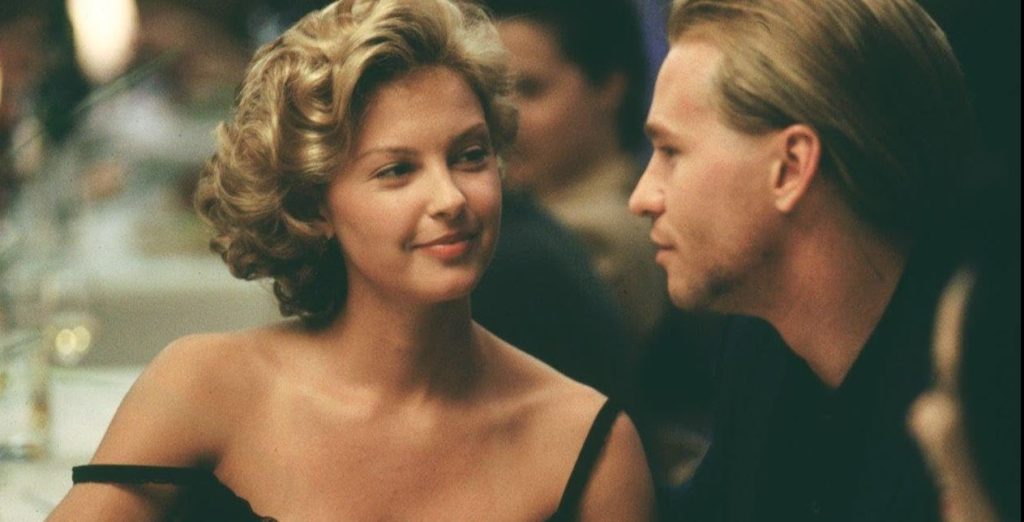
What works against it: The women. Heat depicts a man’s world yet is clogged with ladies and their unreasonable, unmanly demands to talk and share. None are active criminals or help move the plot along. They merely dawdle on the sidelines sulking and pulling faces. Let’s start with Vincent. He’s on the ‘down slope of a marriage’, fighting all the time with his ball and chain in what feels like a rehash of Jacqueline Bisset and Steve McQueen’s relationship in Bullitt, especially when she starts telling him: “You live among the remains of dead people.” Vincent also has to put up with a (poorly developed) step-daughter in the form of Natalie Portman. Introduced as a semi-hysterical brat, she pretty much drops out until a late suicide bid. I have no idea why I’m supposed to care if she lives or dies.
Meanwhile, McCauley gets tangled up with a young graphic designer. Sure, she’s pretty, but for a guy who stresses the crucial need for ‘no attachments’ it’s a big ask that he plans to settle down with this chick after balling her once. She must have one of those silk pussies that Harvey Keitel so enjoyed in Fingers. Plus, she’s a nice, sensitive, intelligent girl so why would she choose to run away with such an obviously high-risk guy knowing full well he’s just wiped out half the city’s police force in a shootout? I know girls like a bad boy, but c’mon… She must know there can never be a future with such a deceptive, quietly monstrous parasite. I would’ve dropped both McCauley and Hanna’s love interests and instead kept the troubled, believable marriage of the gambling-afflicted Chris.
Mann, however, overeggs the pudding throughout, such as the superfluous storyline about a black cook hastily joining McCauley’s gang as a doomed getaway driver. Then there’s the disheveled, swastika-adorned Waingro (Gage). It’s bad enough this obviously thick, clumsy psycho somehow weaves all the plot strands together, but making him a serial killer of young women as well is both bizarre and pointless. I mean, have you ever known a real-life serial killer get involved with stuff like joining a hi-tech gang to knock over an armored van?
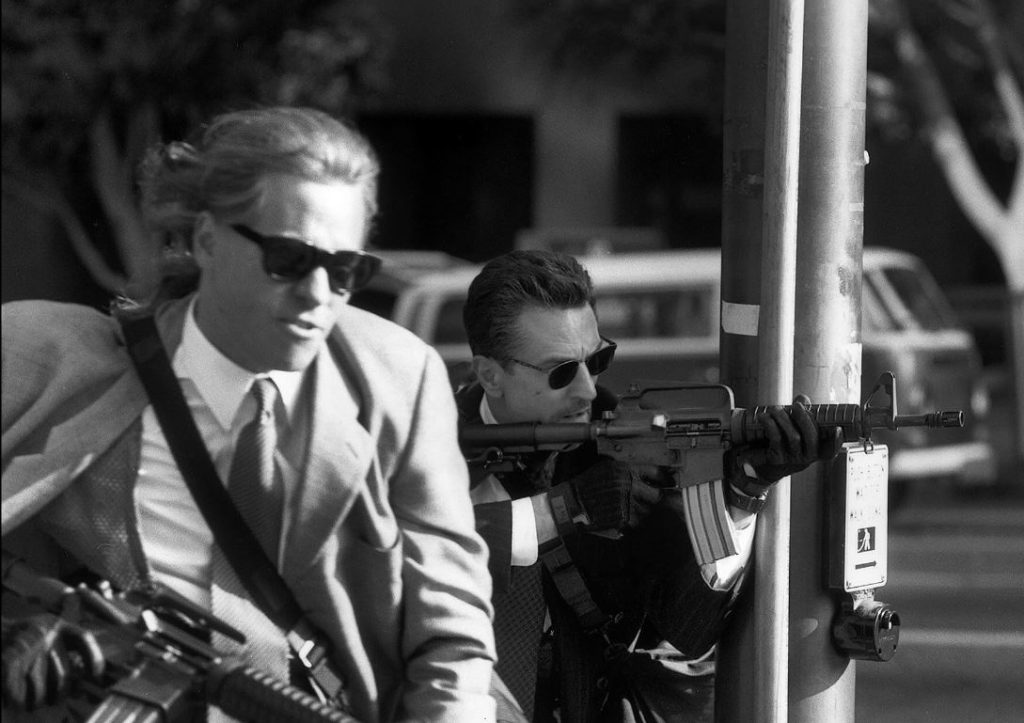
Now while I enjoy a good shoot ’em up like the rest of y’all, Mann’s decision to depict McCauley and chums in a lengthy fire fight outside a bank holding off what appears to be the entire LAPD is also plain daft. McCauley doesn’t even get winged during his escape, despite carrying a wounded Chris and a couple of heavy, cash-stuffed bags. Is this exciting? Absolutely. Is it credible? Well, let’s just say I thought I saw Graham Chapman dressed as a cop hiding behind a car firing one of those joke guns that unfurl the word bang!
As for the battle between our titanic thespians, the much talked about coffee-shop encounter between Pacino and De Niro is rather anticlimactic, achieving little more than to birth the cliché that cops and robbers aren’t too different. Overall, I’d argue De Niro puts in the better shift, mainly because the gum-chewing, finger-clicking Pacino trots out Shouty Al again. I’m not sure when this unfortunate tic began to worm its way into his acting, but I caught 1979’s And Justice for All the other day and he sure got shouty in that one. In Heat he’s occasionally embarrassing, such as when he sits down with a snitch and bellows while banging the table: “Give me all you got! Give me all you got!”
Not long afterward he’s singing, finger pointing and cupping an ear, leaving the half-bewildered snitch with the line: “Don’t waste my mother-fucking time!” It’s hard to believe any detective behaves like this in front of subordinates back in the office, let alone in the field. Later he trots out his pantomime villain act again with a different baddie, treating us to this nonsensical aside: “When I think of asses, a woman’s ass, something comes out of me.”
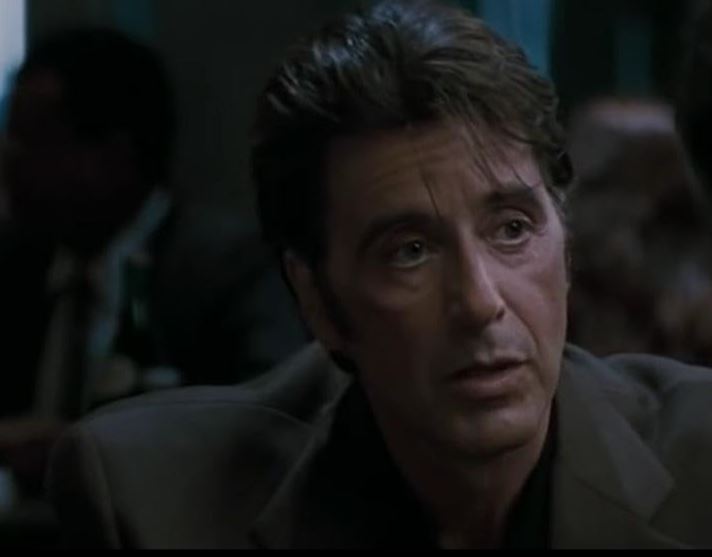
In his quieter moments, of course, Pacino is mostly superb, but that poor dialogue keeps cropping up, such as when telling his constantly stroppy wife: “I told you that when we hooked up, baby, you were gonna have to share me with all the bad people and all the ugly events on this planet.” Er, what? His beat covers Earth? No wonder he’s so grumpy.
Verdict: This is a sprawling, ambitious portrait of cops, criminals and their partners that despite its faults and array of implausibilities (both big and small) still manages to offer a pacy near-three hours. Pacino and De Niro dictate, but they get excellent support from the likes of a nicely underplaying Jon Voight as a reliable, unflappable fence. Just imagine how much better Heat would have been as a two-hour flick minus all those superfluous subplots and tiresome females.
Leave a Reply